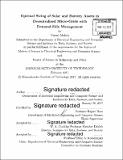Optimal sizing of solar and battery assets in decentralized micro-grids with demand-side management
Author(s)
Mehra, Varun, S.M. Massachusetts Institute of Technology
DownloadFull printable version (22.43Mb)
Other Contributors
Massachusetts Institute of Technology. Department of Electrical Engineering and Computer Science.
Advisor
Rajeev Ram and Munther Dahleh.
Terms of use
Metadata
Show full item recordAbstract
Solar-based community micro-grids and individual home systems have been recognized as key enablers of electricity provision to the over one billion people living without energy access to-date. Despite significant cost reductions in solar panels, these options can still be cost-prohibitive mainly due over-sizing of generation assets corresponding with a lack of ability to actively manage electricity demand. The main contribution shared is the methodology and optimization approach of least-cost combinations of generation asset sizes, in solar panels and batteries, subject to meeting reliability constraints; these results are based on a techno-economic modeling approach constructed for assessing decentralized micro-grids with demand-side management capabilities. The software model constructed is implemented to represent the technical characteristics of a low-voltage, direct current network architecture and computational capabilities of a power management device. The main use-case of the model presented is based on serving representative, aggregated, household-level load profiles combined with simulated power output from solar photovoltaic modules and the kinetic operating constraints of lead-acid batteries at hourly timesteps over year-long simulations. The state-space for solutions is based on available solar module and battery capacities from distributors in Jharkhand, India. Additional work presented also extends to real-time operation of such isolated micro-grids with requisite local computation. First, for load disaggregation and forecasting purposes, clustering algorithms and statistical learning techniques are applied on quantitative results from inferred load profiles based on data logged from off-grid solar home systems. Second, results from an optimization approach to accurately parametrize a lead-acid battery model for potential usage in real-time field implementation are also shared. Economic results, sensitivity analyses around key technical and financial input assumptions, and comparisons in cost reductions due to the optimization of solar and battery assets for decentralized micro-grids with demand-side management capabilities are subsequently presented. The work concludes with insights and policy implications on establishing differentiated willingness-to-pay, tiers of service, and dynamic price-setting in advanced micro-grids.
Description
Thesis: S.M. in Technology and Policy, Massachusetts Institute of Technology, School of Engineering, Institute for Data, Systems, and Society, Technology and Policy Program, 2017. Thesis: S.M., Massachusetts Institute of Technology, Department of Electrical Engineering and Computer Science, 2017. Cataloged from PDF version of thesis. Includes bibliographical references (pages 199-209).
Date issued
2017Department
Massachusetts Institute of Technology. Department of Electrical Engineering and Computer Science; Massachusetts Institute of Technology. Engineering Systems Division; Massachusetts Institute of Technology. Institute for Data, Systems, and Society; Technology and Policy ProgramPublisher
Massachusetts Institute of Technology
Keywords
Institute for Data, Systems, and Society., Technology and Policy Program., Electrical Engineering and Computer Science.